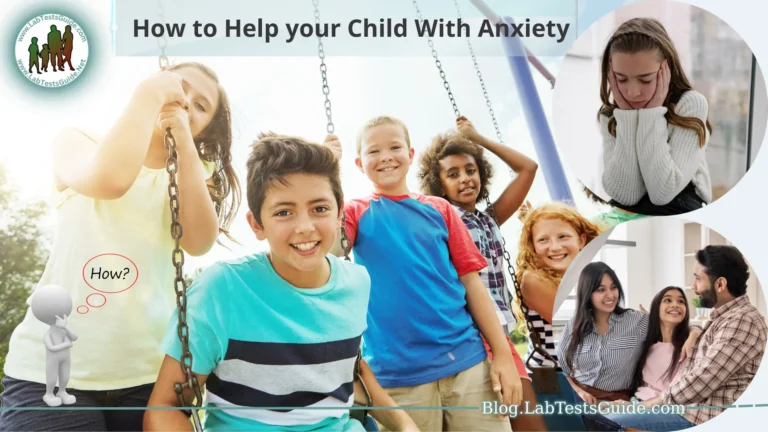Health Tips: Becoming a parent is a remarkable and transformative journey filled with joy, love, and new responsibilities. As you embark on this adventure, ensuring the health and well-being of both yourself and your newborn baby becomes a top priority. From providing proper care and nutrition to creating a safe environment, there are numerous factors to consider when it comes to the health of new parents and babies.

This guide aims to provide you with essential health tips that will empower you to make informed decisions and navigate the early stages of parenthood with confidence. Whether you’re a first-time parent or have experienced parenthood before, these tips will serve as a valuable resource to promote the optimal physical, emotional, and developmental health of both you and your precious little one.
Remember, every baby is unique, and these tips are meant to serve as general guidelines. It’s always important to consult with healthcare professionals for personalized advice and support. Now, let’s delve into the world of health tips for new parents and babies, and discover the key practices that will lay a foundation for a lifetime of well-being.
Preparing for Parenthood:
Here are a few subtopics you can include.
Creating a Safe Environment:
- Baby-proofing the house: Identifying and addressing potential hazards such as electrical outlets, sharp edges, and choking hazards.
- Safe sleep practices: Setting up a crib with a firm mattress, removing suffocation risks, and promoting a safe sleeping environment.
- Installing safety gates and locks: Securing areas of the house to prevent accidents and keep curious babies out of harm’s way.
Assembling Essential Baby Supplies:
- Diapers and changing supplies: Understanding the different types of diapers and gathering necessary supplies like wipes, creams, and changing pads.
- Clothing essentials: Choosing comfortable and appropriate clothing for various weather conditions and stages of development.
- Feeding supplies: Gathering bottles, nipples, formula (if needed), breastfeeding supplies, and burping cloths.
- Bathing and hygiene items: Acquiring baby-friendly soaps, shampoos, towels, washcloths, and a baby bathtub.
Establishing a Support System:
- Seeking prenatal and postnatal care: Finding a healthcare provider who can guide you through the pregnancy journey and provide postnatal care for both mother and baby.
- Engaging with parenting classes and support groups: Joining local parenting classes or support groups to gain knowledge, share experiences, and build a network of support.
- Identifying family and friends who can offer assistance: Relying on trusted family members or friends who can lend a helping hand during the early stages of parenthood.
- Considering professional help: Exploring the option of hiring a postpartum doula or nanny to provide additional support and guidance.
Remember, each family’s needs and preferences may vary. Adapt these suggestions to suit your specific circumstances, and always prioritize the safety and well-being of both you and your baby as you prepare for the incredible journey of parenthood.
Newborn Care:
Here are some subtopics you can include.
Proper Handling and Holding Techniques:
- Supporting the baby’s head and neck: Understanding the fragility of a newborn’s neck and using proper techniques to support their delicate head.
- Learning how to pick up and carry the baby: Using one hand to support the baby’s head and neck while the other hand supports their bottom.
Diapering and Bathing Tips:
- Choosing the right diapers: Understanding the different types of diapers (cloth or disposable) and ensuring a proper fit to prevent leaks and discomfort.
- Diaper changing techniques: Step-by-step instructions for changing diapers, including proper cleaning, applying diaper cream, and securing the diaper.
- Sponge baths for the first weeks: Guidelines for giving gentle sponge baths until the baby’s umbilical cord stump falls off.
- Bathing techniques: Steps for giving a safe and comfortable bath, including water temperature, using mild baby-friendly soap, and drying the baby thoroughly.
Understanding Infant Sleep Patterns:
- Recognizing newborn sleep patterns: Understanding that newborns sleep for short periods, often waking up for feeding and diaper changes.
- Safe sleep guidelines: Creating a safe sleep environment, placing the baby on their back to sleep, and avoiding loose bedding or stuffed animals in the crib.
Remember, each baby is unique, and it’s essential to observe and respond to their individual needs. Providing a nurturing and caring environment will contribute to the overall well-being and development of your newborn.
Feeding and Nutrition:
Here are some subtopics you can include.
Breastfeeding Benefits and Techniques:
- Benefits of breastfeeding: Understanding the numerous advantages of breastfeeding for both the baby and mother, such as providing essential nutrients, promoting bonding, and boosting the baby’s immune system.
- Establishing a breastfeeding routine: Learning effective breastfeeding positions, ensuring a proper latch, and recognizing hunger cues from the baby.
- Overcoming common breastfeeding challenges: Addressing issues like sore nipples, engorgement, or low milk supply, and seeking support from lactation consultants or support groups.
Bottle Feeding and Formula Preparation:
- Safe bottle feeding practices: Sterilizing bottles and nipples, preparing formula safely, and ensuring the correct temperature for feeding.
- Choosing the right formula: Understanding different types of formula (cow’s milk-based, soy-based, etc.), consulting with a healthcare professional if necessary, and selecting appropriate formula for your baby’s needs.
- Feeding techniques: Holding the baby in an upright position during bottle feeding, ensuring a slow and steady flow, and burping the baby after each feeding.
Introduction of Solid Foods:
- Signs of readiness for solid foods: Recognizing when your baby is ready for solid foods, typically around 6 months of age, by observing developmental cues like sitting up with support and showing interest in food.
- Introducing single-ingredient purees: Gradually introducing pureed fruits, vegetables, and grains, one at a time, to observe any allergies or intolerances.
- Progressing to mashed and finger foods: Gradually transitioning to mashed or soft textured foods, and eventually introducing small finger foods to encourage self-feeding and oral motor skills.
Allergies and Food Intolerance Awareness:
- Common allergenic foods: Being aware of common allergenic foods like peanuts, eggs, dairy, soy, wheat, and shellfish, and introducing them cautiously to monitor any allergic reactions.
- Food intolerance and sensitivities: Recognizing signs of food intolerance or sensitivities, such as digestive discomfort or rashes, and seeking guidance from a healthcare professional.
- Introducing potential allergenic foods: Understanding the latest guidelines on introducing allergenic foods early, under medical supervision, to potentially reduce the risk of allergies.
Maintaining a Healthy Diet for Parents:
- Balanced nutrition for breastfeeding mothers: Ensuring a nutritious diet with a variety of fruits, vegetables, whole grains, lean proteins, and healthy fats to support breastfeeding and provide optimal nutrition for the baby.
- Adequate hydration: Drinking plenty of fluids, primarily water, to stay hydrated during breastfeeding or formula feeding.
Remember, feeding practices may vary based on individual circumstances, and it’s important to consult with healthcare professionals for personalized guidance. Your baby’s nutrition plays a vital role in their growth and development, so providing a balanced and nourishing diet will contribute to their overall health and well-being.
Immunizations and Preventive Care:
Here are some subtopics you can include.
Vaccination Schedule and Importance:
- Understanding the vaccination schedule: Familiarizing yourself with the recommended vaccination schedule for your country or region, including the specific vaccines and their timing.
- Benefits of immunizations: Learning about the importance of immunizations in preventing serious diseases, protecting your baby and the community from outbreaks, and providing long-term immunity.
- Addressing vaccine concerns: Addressing common concerns or misconceptions about vaccines and seeking accurate information from reliable sources such as healthcare providers or official health agencies.
Regular Check-ups and Developmental Milestones:
- Importance of well-baby visits: Scheduling regular check-ups with a healthcare provider to monitor your baby’s growth, development, and overall health.
- Tracking developmental milestones: Understanding typical milestones in areas like motor skills, language, and social-emotional development, and discussing any concerns with the healthcare provider.
- Health screenings: Being aware of the recommended health screenings, such as hearing tests or blood tests, to detect any underlying health conditions.
Baby Proofing and Safety Measures:
- Home safety: Implementing safety measures at home, such as securing furniture, covering electrical outlets, using stair gates, and keeping small objects out of reach to prevent accidents.
- Safe sleep practices: Creating a safe sleep environment, including placing the baby on their back to sleep, using a firm mattress, and avoiding loose bedding or soft objects in the crib.
Promoting a Smoke-Free Environment:
- Effects of secondhand smoke: Understanding the harmful effects of secondhand smoke on the baby’s health, including increased risk of respiratory infections, asthma, and sudden infant death syndrome (SIDS).
Managing Pet Interactions:
- Pet safety and hygiene: Ensuring that pets are up to date on vaccinations and regularly examined by a veterinarian, practicing good hygiene, and preventing direct contact between pets and the baby’s face or mouth.
- Supervised interactions: Monitoring interactions between pets and the baby to prevent accidental scratches or bites, and gradually introducing pets to the baby in a controlled manner.
By following the recommended immunization schedule, attending regular check-ups, and implementing safety measures, you can provide your baby with a strong foundation for a healthy and safe life. Remember to consult with healthcare professionals for personalized advice and guidance regarding immunizations and preventive care.
Promoting Physical and Mental Development:
Here are some subtopics you can include.
Tummy Time and Physical Exercises:
- Importance of tummy time: Understanding the benefits of tummy time for strengthening neck and upper body muscles, promoting motor skills, and preventing flat spots on the back of the head.
- Engaging in physical exercises: Introducing age-appropriate exercises and activities, such as gentle stretching, reaching for toys, rolling, crawling, and eventually walking.
Language Development Strategies:
- Reading aloud: Reading age-appropriate books to the baby, using engaging and expressive voices, to enhance language skills and foster a love for reading.
- Conversations and verbal interactions: Engaging in regular conversations with the baby, responding to their coos and babbles, and using simple words and phrases to encourage communication.
- Nursery rhymes and songs: Singing nursery rhymes and songs that include repetitive patterns and rhythms to promote language acquisition and memory skills.
Social Interaction and Bonding Activities:
- Face-to-face interactions: Engaging in frequent face-to-face interactions, making eye contact, and responding to the baby’s social cues to foster social and emotional development.
- Baby massage and gentle touch: Practicing gentle touch and baby massage techniques to promote bonding, relaxation, and sensory stimulation.
Limiting Screen Time and Electronic Devices:
- Minimizing screen exposure: Limiting screen time for babies, as recommended by healthcare professionals, and avoiding screen exposure before the age of 2.
- Opting for interactive and educational media: If screen time is introduced, selecting high-quality and age-appropriate interactive media or educational programs that promote learning and engagement.
Remember, each baby develops at their own pace, and it’s important to provide a stimulating and nurturing environment that supports their individual needs and interests. The key is to engage in activities that promote exploration, physical movement, cognitive stimulation, and social interaction, while allowing for plenty of love, care, and playtime.
Maintaining Emotional Well-being:
Here are some subtopics you can include.
Bonding and Attachment:
- Skin-to-skin contact: Engaging in skin-to-skin contact with your baby to promote bonding, regulate their body temperature, and release bonding hormones.
- Eye contact and smiling: Making eye contact and smiling at your baby to establish a strong emotional connection and foster positive interactions.
- Responding to cues: Being responsive to your baby’s cues for comfort, feeding, and attention, which helps them feel secure and nurtured.
Self-care for Parents:
- Prioritizing self-care: Recognizing the importance of self-care for your own emotional well-being, including getting adequate rest, eating nutritious meals, and engaging in activities that bring you joy.
- Seeking support: Building a support network of family, friends, or support groups to share your experiences, seek guidance, and alleviate any feelings of stress or isolation.
Emergency Preparedness:
Here are some subtopics you can include.
Emergency Contact Information:
- Emergency numbers: Keep a list of important emergency contact numbers, including local emergency services, your healthcare provider, and poison control.
- Family and friends: Maintain a list of family members or trusted friends who can be contacted during emergencies or who can assist you if needed.
First Aid and CPR Training:
- First aid knowledge: Consider attending a first aid and CPR course specifically designed for infants and children to learn essential life-saving skills.
- Basic first aid supplies: Keep a well-stocked first aid kit at home and in your diaper bag, including items like bandages, antiseptic solution, and digital thermometer.
Safety Measures at Home:
- Childproofing: Childproof your home by securing cabinets, covering electrical outlets, installing safety gates, and removing small objects that can pose choking hazards.
- Fire safety: Install smoke detectors on each floor of your home, regularly check their batteries, and create a fire escape plan with designated meeting points outside the house.
Disaster Preparedness:
- Natural disasters: Research and understand the potential natural disasters in your area (such as earthquakes, hurricanes, or floods) and prepare an emergency kit with essentials like water, non-perishable food, flashlights, and a battery-powered radio.
- Weather-related precautions: Take necessary precautions during extreme weather conditions, such as dressing your baby appropriately for hot or cold temperatures and ensuring their safety during storms or power outages.
Safety Measures during Outings:
- Public places: Be cautious in public places by keeping an eye on your baby, securing your belongings, and being aware of potential hazards or crowded areas.
- Emergency supplies: Carry essential items in your diaper bag, such as extra diapers, wipes, a change of clothes, and any necessary medications.
It is important to regularly review and update your emergency preparedness plan as your baby grows and your circumstances change. Stay informed about potential hazards in your area and seek guidance from local authorities or healthcare professionals regarding specific emergency preparedness measures. By being prepared, you can help ensure the safety and well-being of your family during unexpected events.
Conclusion:
Becoming a new parent is an exciting and transformative journey, filled with joy, love, and new experiences. However, it also comes with its share of challenges and responsibilities. By equipping yourself with knowledge and following these health tips, you can provide the best possible care for your baby and ensure their well-being.
From preparing for parenthood and understanding newborn care to focusing on feeding and nutrition, immunizations, and preventive care, you have learned the essential aspects of caring for your baby’s physical health. Additionally, promoting their physical and mental development, maintaining emotional well-being, and being prepared for emergencies contribute to their overall health and safety.
Remember, each baby is unique, and what works for one may not work for another. Trust your instincts as a parent and seek guidance from healthcare professionals when needed. Surround yourself with a support network of family and friends who can offer assistance, understanding, and encouragement throughout your parenting journey.






